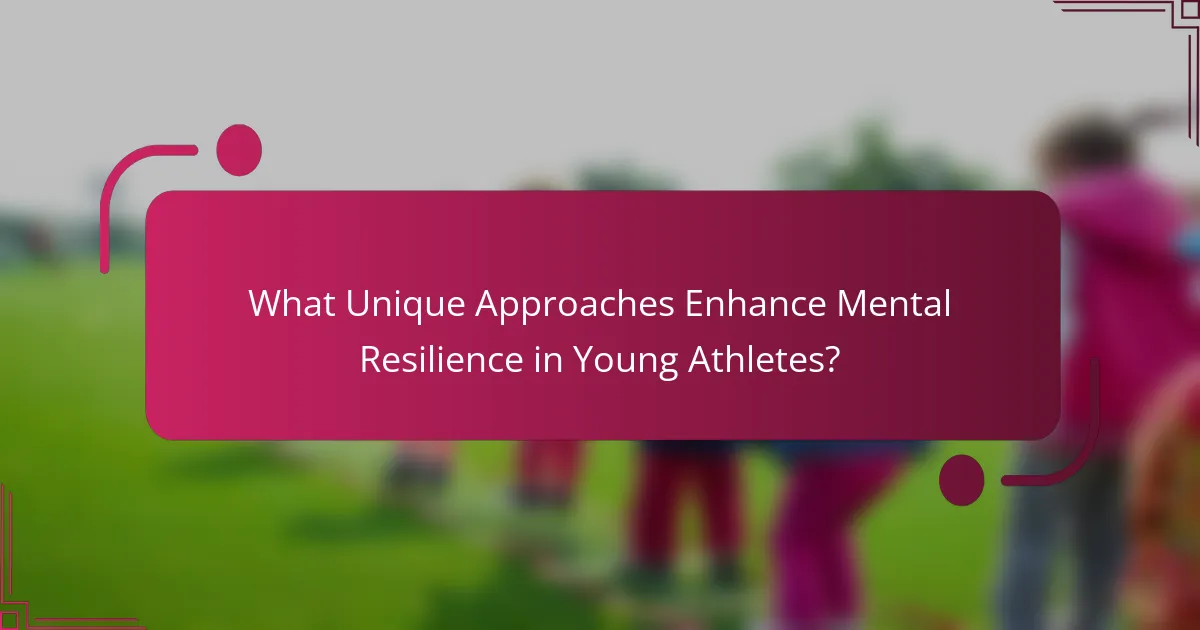Mental health strategies for athletes are crucial for enhancing performance and overall well-being. This article explores techniques like mindfulness training, goal setting, and positive self-talk. It also highlights personalized approaches and community support to build resilience. Finally, it emphasizes the importance of open communication and access to mental health resources for young athletes.

Mental Health Strategies for Youth Athletes: What Are They?
Mental health strategies for youth athletes focus on resilience, performance enhancement, and overall well-being. These strategies include mindfulness training, goal setting, and positive self-talk. Research shows that athletes who practice mindfulness report lower anxiety levels and improved focus. Additionally, setting achievable goals helps athletes maintain motivation and manage stress effectively. Positive self-talk fosters a growth mindset, allowing athletes to overcome challenges and setbacks. These techniques collectively contribute to a healthier mental state, enhancing athletic performance and personal development.
Why is Mental Health Important in Sports for Young Athletes?
Mental health is crucial in sports for young athletes as it enhances performance and fosters resilience. Effective mental health strategies can reduce anxiety, improve focus, and boost self-esteem. Research indicates that athletes with strong mental health are more likely to achieve their goals and maintain a positive outlook. Training programmes that incorporate mental well-being can lead to improved athletic performance and overall life satisfaction. Prioritising mental health creates a supportive environment that encourages young athletes to thrive both on and off the field.
How Can Mental Health Impact Athletic Performance?
Mental health significantly impacts athletic performance by influencing focus, motivation, and resilience. Athletes with strong mental health display improved concentration, enabling better execution of skills during competition. Research indicates that mental strategies, such as visualization and mindfulness, enhance performance by reducing anxiety and increasing confidence. Additionally, fostering a supportive environment contributes to overall well-being, which is crucial for sustaining long-term athletic success. Implementing mental health strategies can lead to better outcomes on and off the field.
What Are Common Mental Health Challenges Faced by Youth Athletes?
Youth athletes commonly face mental health challenges such as anxiety, depression, and burnout. These issues can significantly impact their performance and overall well-being.
Anxiety often stems from performance pressure and fear of failure. Studies show that up to 30% of young athletes experience significant anxiety levels. Depression can arise from injuries or lack of playing time, affecting motivation and self-esteem. Burnout, characterised by emotional exhaustion and reduced performance, is prevalent among athletes who overtrain or lack balance in their lives.
Addressing these challenges involves implementing mental health strategies that promote resilience. Techniques such as mindfulness, positive self-talk, and goal-setting can enhance mental toughness and performance. Creating supportive environments that prioritise mental well-being is essential for fostering a healthy athletic experience.

What Universal Strategies Support Mental Well-Being in Young Athletes?
To support mental well-being in young athletes, implement strategies like mindfulness, positive self-talk, and goal setting. These methods enhance resilience and performance. Mindfulness reduces stress and improves focus. Positive self-talk boosts confidence and motivation. Goal setting provides direction and purpose, fostering a sense of achievement.
How Does Physical Training Influence Mental Health?
Physical training significantly enhances mental health by reducing anxiety, improving mood, and fostering resilience. Regular exercise stimulates the release of endorphins, which are natural mood lifters. Research shows that athletes often report lower levels of depression and stress, contributing to overall well-being. Additionally, physical training builds mental toughness, crucial for performance under pressure. This resilience translates to better coping strategies in daily life, showcasing the profound connection between physical activity and mental health.
What Role Does Nutrition Play in Mental Resilience?
Nutrition significantly enhances mental resilience by providing essential nutrients that support brain function and emotional stability. A balanced diet rich in omega-3 fatty acids, antioxidants, and vitamins can improve mood and cognitive performance. For instance, studies show that athletes with higher omega-3 intake report lower levels of anxiety and depression, which fosters resilience. Additionally, hydration plays a crucial role; even mild dehydration can impair cognitive function and mood. Prioritising nutrition helps athletes maintain focus and manage stress effectively, ultimately enhancing performance and well-being.
How Can Coaches Foster a Positive Mental Environment?
Coaches can foster a positive mental environment by promoting open communication and encouraging athletes to express their feelings. Establishing trust allows athletes to feel safe discussing challenges. Regular team-building activities enhance relationships, while positive reinforcement boosts confidence. Additionally, integrating mindfulness practices helps athletes manage stress and maintain focus.

What Unique Approaches Enhance Mental Resilience in Young Athletes?
Unique approaches to enhance mental resilience in young athletes include mindfulness training, cognitive-behavioral techniques, and goal-setting strategies. Mindfulness fosters present-moment awareness, reducing anxiety and improving focus. Cognitive-behavioral techniques help athletes reframe negative thoughts, promoting a positive mindset. Goal-setting strategies create clear objectives, enhancing motivation and performance. These methods collectively build mental strength, contributing to overall well-being and athletic success.
How Can Goal Setting Improve Mental Health?
Goal setting can significantly enhance mental health by providing structure and motivation. It fosters a sense of purpose, reduces anxiety, and improves self-esteem. Athletes who set specific, measurable goals experience increased resilience and performance. Research indicates that goal-oriented individuals report higher levels of well-being and lower stress levels. This unique attribute of goal setting helps athletes navigate challenges more effectively, ultimately leading to improved mental health outcomes.
What Is the Role of Mental Skills Training?
Mental skills training enhances athletes’ performance by developing focus, confidence, and emotional regulation. This training fosters resilience, enabling athletes to cope with pressure and setbacks effectively. Techniques like visualization and self-talk improve mental toughness and overall well-being. Research indicates that athletes who engage in mental skills training experience a significant increase in performance metrics and psychological health.
How Can Peer Support Networks Benefit Young Athletes?
Peer support networks significantly benefit young athletes by enhancing their mental health and resilience. These networks provide emotional support, reduce feelings of isolation, and foster a sense of belonging. Athletes who engage in peer support report improved coping strategies and better performance under pressure. Studies show that 70% of young athletes feel more confident when supported by peers, leading to enhanced well-being and athletic outcomes.

What Rare Strategies Are Emerging in Mental Health Support for Youth Athletes?
Emerging strategies in mental health support for youth athletes focus on personalized approaches and community integration. These unique strategies emphasize resilience-building through mental skills training, social support networks, and mindfulness practices. Programs are increasingly incorporating technology, such as mobile apps for mental wellness tracking, enhancing accessibility and engagement. As a result, youth athletes receive tailored resources that address their specific needs and challenges, promoting overall well-being and performance.
How Can Technology Be Utilized for Mental Health Monitoring?
Technology can enhance mental health monitoring for athletes through real-time data collection and analysis. Wearable devices track physiological metrics like heart rate and sleep patterns, providing insights into stress and recovery. Mobile apps facilitate self-assessment and mood tracking, allowing athletes to identify triggers and patterns. Virtual therapy sessions offer accessible support, fostering resilience and well-being. Integrating these tools can significantly improve mental health outcomes and performance.
What Innovative Programs Exist for Mental Health in Sports?
Innovative programs for mental health in sports focus on resilience, performance enhancement, and overall well-being. Examples include mindfulness training, mental health workshops, and peer support initiatives. These programs aim to equip athletes with coping strategies to manage stress and anxiety effectively. Additionally, organizations are increasingly integrating mental health professionals into coaching staff, promoting a holistic approach to athlete care.
How Can Mindfulness and Meditation Techniques Be Applied?
Mindfulness and meditation techniques can enhance athletes’ mental health by improving focus, reducing anxiety, and fostering resilience. These practices encourage present-moment awareness, which helps athletes manage stress and optimize performance. Techniques such as breath control, guided imagery, and body scanning can be integrated into training routines. Research shows that regular practice can lead to measurable improvements in mental toughness and overall well-being.

What Are the Key Takeaways for Supporting Youth Athletes’ Mental Health?
Supporting youth athletes’ mental health requires a multifaceted approach focusing on resilience, performance, and well-being. Key strategies include fostering open communication, promoting a balanced lifestyle, and providing mental health resources.
1. Encourage open discussions about mental health to reduce stigma.
2. Implement regular check-ins to assess emotional well-being.
3. Teach coping strategies to manage stress and anxiety.
4. Promote a balanced schedule that includes rest and recovery.
5. Provide access to mental health professionals for guidance.
6. Involve parents and coaches in supporting mental health initiatives.
These strategies can enhance athletes’ mental resilience and overall performance.
What Best Practices Can Coaches Implement for Mental Wellness?
Coaches can implement several best practices for mental wellness in athletes. Prioritise open communication to foster trust and understanding. Incorporate mindfulness techniques to enhance focus and reduce stress. Encourage regular mental health check-ins to address challenges early. Use positive reinforcement to build confidence and resilience. Finally, promote a balanced approach to training that includes rest and recovery to support overall well-being.
What Common Mistakes Should Be Avoided When Supporting Young Athletes?
To support young athletes effectively, avoid common mistakes that can hinder their mental health and performance. Prioritise open communication, allowing athletes to express feelings and concerns without fear. Focus on their individual needs, rather than imposing unrealistic expectations. Encourage a balanced approach to competition, emphasizing enjoyment and personal growth over winning. Recognise signs of stress or burnout early, and provide appropriate support or resources. Finally, foster a positive environment that celebrates effort and resilience, promoting well-being and long-term success.
How Can Parents Support Their Child’s Mental Health in Sports?
Parents can support their child’s mental health in sports by fostering open communication and promoting a balanced approach to competition. Encourage regular discussions about feelings related to performance and stress. Focus on enjoyment and personal growth rather than solely on winning. Establish a supportive environment by attending games and showing interest in their activities. Additionally, educate yourself on mental health resources, such as counselling or workshops, to better assist your child. By prioritising mental well-being, parents can enhance resilience and overall performance in sports.